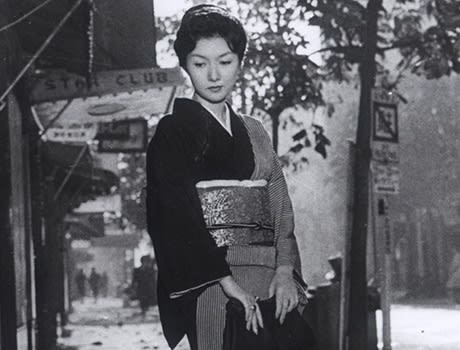Following the trajectory of many works by Mikio Naruse, When a Woman Ascends the Stairs deconstructs and analyzes the rapid cultural change and westernization of Japan in the late '50s. In particular, his preoccupation with the role of women and capitalist impulse propels this work (and many others), suggesting that injecting women into the workforce and giving them the freedom of choice led to a morally abject society where the importance of the traditional family unit was dissolved.
Bar hostess Keiko (Hideko Takamine) lives a self-perpetuating life of cyclic consumer spending, renting an expensive apartment in the city in order to radiate the perception of glamour necessary to make money at her hostess job. Friends and family beg her for money and clients swoon over her, using their wiles and their wallets to steal away her chastity and dignity, whether it be for one night, or a lifetime of marriage.
Getting older, Keiko finds herself at a crossroads, wondering whether she should buy her own bar and live a life of servitude and independence, or simply get married to one of her amorous clients. Both options have their pros and cons, and neither comes as easily as suggested.
As the title suggests, Naruse is interested in capturing the mundane nature of it all. Keiko (or Mama) is projecting the idea of glamour, while merely going through the motions of expectation, repeatedly ascending the same stairs to the same job. She's never able to move ahead and when she makes efforts to do so, she is punished by the reality that the men around her are similarly projecting an idea of self that isn't actual or sustainable.
The implication is clear: contextually modern Japan was all a superficial, unsustainable façade in the eyes of Mikio Naruse. As such, When a Woman Ascends the Stairs plays as a slow-building tragedy that holds its hand close until the final climactic arc, where emotions are finally bared and everyone's hidden self is exposed.
When all is said and done, we're left with the idea that survival means sustained repression. According to the text, there is no room for sincerity or honesty in a consumer culture straying from traditionalist values.
It's all quite archaic and absurdly, hypocritically, Aristotelian, but Naruse's ability to communicate a feeling or idea through slight movements and repetitive imagery packs a devastating punch even fifty years after the fact.
When a Woman Ascends the Stairs screens at the TIFF Bell Lightbox as part of the Japanese Divas retrospective on March 24th, 2013 at 7pm.
(Toho Co.)Bar hostess Keiko (Hideko Takamine) lives a self-perpetuating life of cyclic consumer spending, renting an expensive apartment in the city in order to radiate the perception of glamour necessary to make money at her hostess job. Friends and family beg her for money and clients swoon over her, using their wiles and their wallets to steal away her chastity and dignity, whether it be for one night, or a lifetime of marriage.
Getting older, Keiko finds herself at a crossroads, wondering whether she should buy her own bar and live a life of servitude and independence, or simply get married to one of her amorous clients. Both options have their pros and cons, and neither comes as easily as suggested.
As the title suggests, Naruse is interested in capturing the mundane nature of it all. Keiko (or Mama) is projecting the idea of glamour, while merely going through the motions of expectation, repeatedly ascending the same stairs to the same job. She's never able to move ahead and when she makes efforts to do so, she is punished by the reality that the men around her are similarly projecting an idea of self that isn't actual or sustainable.
The implication is clear: contextually modern Japan was all a superficial, unsustainable façade in the eyes of Mikio Naruse. As such, When a Woman Ascends the Stairs plays as a slow-building tragedy that holds its hand close until the final climactic arc, where emotions are finally bared and everyone's hidden self is exposed.
When all is said and done, we're left with the idea that survival means sustained repression. According to the text, there is no room for sincerity or honesty in a consumer culture straying from traditionalist values.
It's all quite archaic and absurdly, hypocritically, Aristotelian, but Naruse's ability to communicate a feeling or idea through slight movements and repetitive imagery packs a devastating punch even fifty years after the fact.
When a Woman Ascends the Stairs screens at the TIFF Bell Lightbox as part of the Japanese Divas retrospective on March 24th, 2013 at 7pm.
